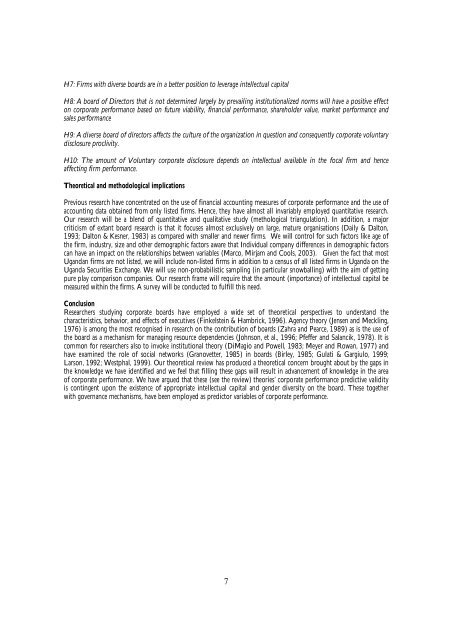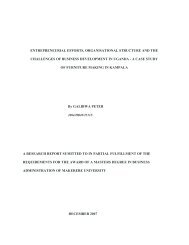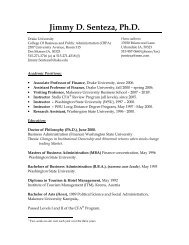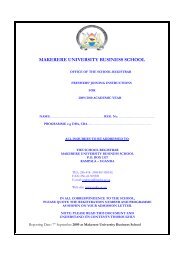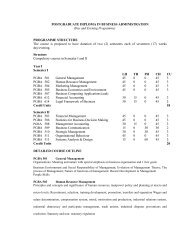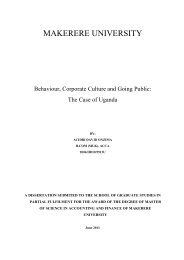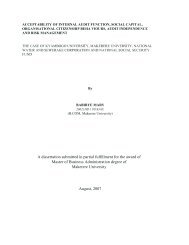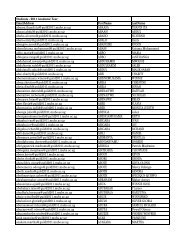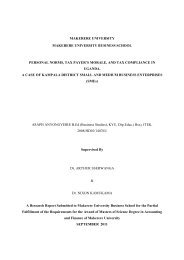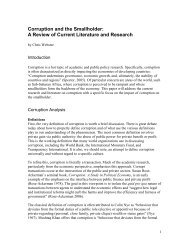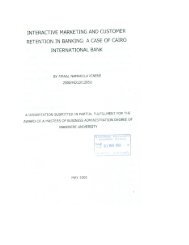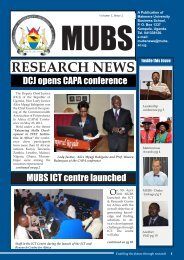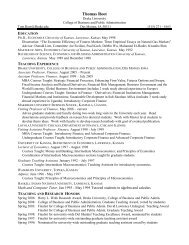13th Annual International Management Conference Proceeding
13th Annual International Management Conference Proceeding
13th Annual International Management Conference Proceeding
Create successful ePaper yourself
Turn your PDF publications into a flip-book with our unique Google optimized e-Paper software.
H7: Firms with diverse boards are in a better position to leverage intellectual capital<br />
H8: A board of Directors that is not determined largely by prevailing institutionalized norms will have a positive effect<br />
on corporate performance based on future viability, financial performance, shareholder value, market performance and<br />
sales performance<br />
H9: A diverse board of directors affects the culture of the organization in question and consequently corporate voluntary<br />
disclosure proclivity.<br />
H10: The amount of Voluntary corporate disclosure depends on intellectual available in the focal firm and hence<br />
affecting firm performance.<br />
Theoretical and methodological implications<br />
Previous research have concentrated on the use of financial accounting measures of corporate performance and the use of<br />
accounting data obtained from only listed firms. Hence, they have almost all invariably employed quantitative research.<br />
Our research will be a blend of quantitative and qualitative study (methological triangulation). In addition, a major<br />
criticism of extant board research is that it focuses almost exclusively on large, mature organisations (Daily & Dalton,<br />
1993; Dalton & Kesner, 1983) as compared with smaller and newer firms. We will control for such factors like age of<br />
the firm, industry, size and other demographic factors aware that Individual company differences in demographic factors<br />
can have an impact on the relationships between variables (Marco, Mirjam and Cools, 2003). Given the fact that most<br />
Ugandan firms are not listed, we will include non-listed firms in addition to a census of all listed firms in Uganda on the<br />
Uganda Securities Exchange. We will use non-probabilistic sampling (in particular snowballing) with the aim of getting<br />
pure play comparison companies. Our research frame will require that the amount (importance) of intellectual capital be<br />
measured within the firms. A survey will be conducted to fulfill this need.<br />
Conclusion<br />
Researchers studying corporate boards have employed a wide set of theoretical perspectives to understand the<br />
characteristics, behavior, and effects of executives (Finkelstein & Hambrick, 1996). Agency theory (Jensen and Meckling,<br />
1976) is among the most recognised in research on the contribution of boards (Zahra and Pearce, 1989) as is the use of<br />
the board as a mechanism for managing resource dependencies (Johnson, et al., 1996; Pfeffer and Salancik, 1978). It is<br />
common for researchers also to invoke institutional theory (DiMagio and Powell, 1983; Meyer and Rowan, 1977) and<br />
have examined the role of social networks (Granovetter, 1985) in boards (Birley, 1985; Gulati & Gargiulo, 1999;<br />
Larson, 1992; Westphal, 1999). Our theoretical review has produced a theoretical concern brought about by the gaps in<br />
the knowledge we have identified and we feel that filling these gaps will result in advancement of knowledge in the area<br />
of corporate performance. We have argued that these (see the review) theories’ corporate performance predictive validity<br />
is contingent upon the existence of appropriate intellectual capital and gender diversity on the board. These together<br />
with governance mechanisms, have been employed as predictor variables of corporate performance.<br />
7


